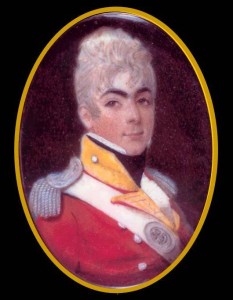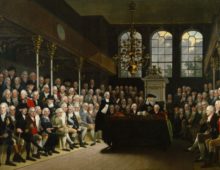Soldier’s Story: Thomas Chambers, “a Strange Mortal”
Thomas Walker Chambers was a professional soldier who served in India and in Europe and was at the Battle of Waterloo.
“A strange mortal, but an admirable soldier.” This was the opinion of Edward Macready on one of the most distinguished officers in the 30th Regiment. He wrote in his journal, “My forbearance does not proceed from any regard to the ridiculous aphorism de mortuis nil nisi bonum [speak no ill of the dead], but from respect for the memory of a man whose valour and abilities were undeniable.”
Macready was thinking back to the time when both of them had been serving in Flanders, in 1813, and, young and bumptious, he had got on the wrong side of Chambers, a stickler for proper behaviour and one of the most experienced officers in the 30th. His rather grudging compliment to Chambers’ ability was fully deserved, but his other comment, “a strange mortal”, also seems to have contained an element of truth.
Thomas Walker Chambers was born in 1781 in Lowestoft, the fourth child and only surviving son of John Chambers and Mary Walker. His father was a herring merchant, a man of some substance, and partner to his wife’s father, who had interests in a porcelain factory, brick-making and the herring trade. Records identify him as “Philip Walker, gent.”, and his status entitled him to a coat of arms. The Lowestof Porcelain company trades to this day, and I include here two illustrations of their work:

Illustrations by kind permission of the manufacturers, further details at: www.lowestoftporcelain.com
Thus Chambers’ background was typical of many upper middle class young men who acquired commissions in the army of the day.
What motivated young Thomas to pursue a military career can only be surmised. Obviously, the herring trade did not appeal to him. In the 1790s Britain was at war with Revolutionary France, so perhaps he succumbed to the lure of a more exciting life.
In his teens he was commissioned into the 17th Regiment. His moneyed background makes it probable that his ensigncy was purchased. Certainly, his grandfather’s social position would have guaranteed that the two sponsors required would have been easy to find.
He spent some years with his regiment in Minorca but in 1802, as a result of the Peace of Amiens, Lieutenant Chambers as he now was found himself on halfpay when the 17th lost its second battalion. Within a year, however, the Peace had collapsed and regiments were required to augment. Chambers was one of several halfpay officers who joined the 30th in the summer of 1803.
At the beginning of 1804 he sailed with his new regiment to Ireland. Initially he was with the second battalion, the feeder and training unit for the first. When he transferred to the first at the end of the year, he had the chance of active service, which was quick in coming.
Late in 1805 the 1/30th formed part of Lord Cathcart’s expedition to north Germany, but if Chambers was hoping for military glory he was quickly disappointed. The expedition was aborted and by March 1806 the battalion was back in England. Two months later they sailed for India.
This may have been a frustrating situation for an ambitious young officer. Wellesley’s victories lay in the past and the Pindari Wars, in the future. When life did become interesting for Chambers it was not in a way he would have wished.
In March 1807, a month before he was promoted to captain, he went to Vellore as part of a detachment under the command of Captain Thomas Jackson. Exactly what happened between Jackson and Chambers is unclear but in October 1808 the two men, along with Liuetenants Powell, Nicholson and Barlow, were returned as attending a court martial. In November Chambers was suspended from rank and pay for three months.
There is some evidence, from the subsequent court martial of Chambers’ friend, Nicholson, that Chambers was exonerated of all but a minor charge. Certainly, the sentence was very mild for what may well have been insubordination.
Nevertheless, the matter rankled and Chambers challenged Jackson to a duel (in which neither was hurt) to settle matters. Nicholson was then heard to say that blood would be shed before the affair was resolved. By this point it seems that both Chambers and Nicholson were being ostracised by the other officers of the battalion. Determined to resolve things in his own way, Major Vaumorel (in command of the battalion) placed them both under arrest in July 1809.
Vaumorel then gave them the choice of resigning from the regiment, with the promise of a recommendation, or facing a court martial. Chambers signed, since he had a simple solution to the problem. Nicholson refused to sign until the recommendation was in his hands and was then charged with ungentlemanly conduct (for not trusting the word of his commanding officer) and instigating a duel. This second charge referred to his claim that blood would be shed.
Chambers went to Madras, ready to sail back to Europe, but was then summoned to appear as a prosecution witness against Nicholson. A very unwilling witness whose testimony did nothing to help the prosecution cause. As a result Nicholson was found guilty only of saying that blood would be shed, although not of instigating a duel, and received a reprimand by letter. Indeed, the court were of the opinion that he had been justified in refusing to sign the resignation without a recommendation.
Chambers was now free to continue his journey to Europe.
By April 1810 he was at sea in command of a detachment of 16 invalids. It is unclear when he reached England but by September he was in Cadiz with the second battalion, to which he properly belonged. How he achieved this can only be supposition. A detachment from the depot under the command of Ensign Neville embarked from Portsmouth in July 1810. By the time they arrived in Cadiz they had been joined by Captain Craig from the staff, Ensign Freear from the depot – and Chambers from India. It would seem that signing the resignation had been a means to an end.
Chambers now took command of the light company, a particularly prestigious position within the battalion. As a result, he saw what little action the battalion experienced at Fuentes de Oñoro in May 1811, some skirmishing on the extreme left of the allied position with French tirailleurs posted opposite them.
At Badajoz in April 1812 the light companies of the second brigade of the fifth division (2/4th, 2/30th. 2/44th) along with a detached company of Black Brunswick Jägers, formed the storming party when the division escaladed the San Vicente bastion. The first men up the ladders inevitably took the heavist casualties. The officer commanding the 2/30th, Major George Grey, was mortally wounded, while Chambers suffered wounds which kept him out of action throughout the summer. Thus he missed the victory at Salamanca in which the fifth division played a notable part.
When he rejoined the battalion they were about to march to Burgos, where the fifth division acted as a coveering force while other divisions pursued the unsuccessful siege. By October the allies were in retreat. On the 25th the fifth division were charged with holding a position at Villamuriel so that the rest of the army could withdraw from a dangerous position. The light company, with its skirmishing role, played an important part in this successful action under Chambers’ command.
Chambers remained in the Peninsula with four strong companies when six weak companies were sent home in January 1813. In June Wellington reluctantly sent home the remainder of the battalion, who joined their comrades in Jersey.
This was a short respite. January 1814 saw them in Flanders as part of General Graham’s expedition to drive the French out of Antwerp. This was the point at which Macready joined the battalion as a volunteer and was posted to the light company. He recorded how, on one occasion when a man about to go into action for the first time showed some reluctance, Chambers remarked that “a young man must not be judged harshly of for a little timidity on his first essay in arms.” The man in question, presumably overhearing the remark, then behaved with gallantry – a glimpse, perhaps. of Chambers’ methods of command.
The battalion remained in Belgium after Napoleon’s first abdication. Chambers returned to England in December1814 with a party of discharged men and took the opportunity to purchase a vacant majority, although he was not the senior captain in the regiment. Conveniently, the senior captain was in India.
This brings us to Napoleon’s hundred days. Chambers returned to Belgium in March. At Quatre Bras he was de facto commander of the battalion after Lieutenant Colonel Hamilton was wounded. Major Bailey, one of his superiors, was still in Brussels while the other major, Vigoureux, was commanding a detached light infantry unit. Certainly, it was Chambers’ skill and determination which, according to Macready, enabled the 2/30th to take Germioncourt late in the action.
Two days later the battalion were in the centre of the allied position at Waterloo, and once again Chambers found himself in command when both Bailey and Vigoureux were wounded. He seems to have exercised this command with his usual competence, particularly after a moment of panic caused by an order to retreat under a heavy French artillery barrage.
This was late in the battle.
What happened next is uncertain. One account has Chambers shot as he desperately galloped his horse into the safety of a square. Another has him standing with a group of officers, each of them congratulating himself on his survival. Chambers expressed the hope that he would be promoted to lieutenant colonel. Moments later he was killed by a stray shot.
The most ironic account comes from Captain Arthur Gore of the 30th.
“About half past six [probably a little later] at the moment he was declaring ‘that he had hitherto escaped unhurt, and that he was too small to be hit,’ he received a ball through the heart, from a tirailleur of the guards, and instantly expired.”
Macready, who put Chambers’ death some time after seven o’clock, recorded how
“When Chambers fell, his friend Nicholson threw himself on the body and sobbed aloud. ‘My friend – my friend!’”
(Nicholson had joined the second battalion in 1813.) Macready also tells the story of how “Two officers of ours were not on terms; the one saw the other behaving gallantly, he ran up to him and cried, ‘Shake hands, and forgive all that has passed; you’re a noble fellow.’”
This seems to be an account of how Chambers and Macready were reconciled.
Did Chambers have a premonition of his death? There is a story that he sent his watch and his will to his brother-in-law, John Diston Powles, on the eve of the battle.
There is no doubt that his death was mourned by more then Nicholson. Gore wrote:
“I cannot remain deaf to the voice of friendship and of worth. Of that number, there is no-one more worthy ‘of the voice of praise’ than my friend and companion in arms, Major T.W. Chambers….He was an active, zealous, and intelligent officer, and a great loss to his regiment, both as a soldier, and as a gentleman.”
As the memorial tablet in St Margaret’s Church, Lowestoft, puts it,
“after highly distinguishing himself in Europe and India for 18 years [he] fell gloriously fighting at the memorable Battle of Waterloo on the 18th day of June in the 34th year of his life.”



